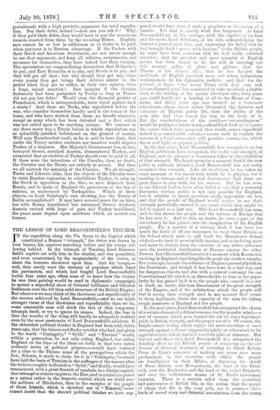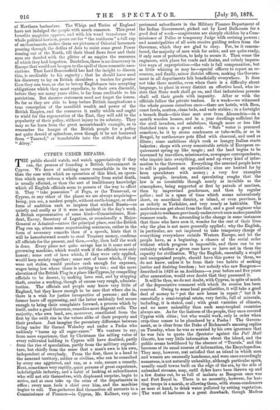THE LESSON OF LORD BEACONSFIELD'S TRIUMPH.
Ithe expedition along the Via Sacra to the Capitol which 1 constituted a Roman " triumph," the victor was drawn by four horses, his captives marching before and his troops fol- loWing behind. In the triumph of Tuesday, Lord Beacons- field's captive sat with him in the chariot, and Was permitted, and even constrained, by the magnanimity of the victor, to share the honours showered upon him. And his troops,— well, they surely were the Streams of populace which lined the pavetnents, and Which had fought Lord Beaconsfield's battle fin* years ago, when none of us knew how the victory he Wats then gaining would be used in diplomatic campaigns to spread a superficial she* of Oriental brilliance and Oriental feebleness over the till then Solid structure of the British Empire. But-whatever we may think of the showiness and superficiality of the Success achieved by Lord Beaconatield,and no one holds stronger Vievilt of that showiness and superficiality than we do, .ga-no reasonable men will Shirk the fact of that temporary Triumph itself, of try to ignore its causes. Indeed, the fear is that the Wonder of the thing will hardly be adequately realised even by the most passionate of Lord Beaconsfield's admirers. If the shrewdest political thinker in England had been told, thirty years ago, that the bizarre and flashy novelist who had just given to the world "Coningsby," " and " Tancred " would, within a generation, be not only ruling England, but ruling England on the lines of the ideas set forth in that very extra- ordinary series of political primers,—would have restored for a time to the Throne some of the prerogatives which the Jew, Sidonia, is made to claim for it in " Coningsby,"—would have laid the basis of Toryism in the suffrages of the masses after the fashion roughly indicated in " Sybil ;" and finally, would have Commenced, with a great flattish of cymbals, in a foreign capital, that attempt to restore empire to the East, and to centre our power as a nation rather in the despotic control which we wield over the millions of Hindostan, than in the energies of the people of the Mande, which is sketched Ott in " Tancred,"--.-we cannot doubt that the shrewd political thinker we have sup- posed would have treated such a prophecy as the raving of a I lunatic. Yet that is exactly what has happened. As Lord Beaconsfield sat in his carriage, with the captive of his bow and his spear, Lord Salisbury, at his side, acknowledging the flatteries poured upon him, and expressing his belief that he had brought hack "peace, with honour," to the British people, he must have been conscious that be had really achieved miracles ; that the proudest and most scornful of English nobles has been tamed to do his will in carrying out this strange policy of glare and glitter ; that the Throne is his firmest ally ; that he has dazzled the multitude of English practical men, and sober, industrious working-men, by his diplomatic rockets ; and that for the present, at least, " the weary Titan, with deaf ears and labour-dimmed eyes," has consented to take up calmly a double load, at the bidding of the quaint ideologue who, forty years ago, could hardly get a hearing at all in the House of Com- mons, and thirty years ago was treated as a fortunate adventurer, whose career rather illustrated the fairness and tolerance of English public life, than the ability of the man who had thus forced his way to the front of it. But the wonderfulness of the result.,—" astoundingness " would be perhaps a better word,—should not lead us to ignore the causes which have prepared that result, causes superficial indeed to a considerable extent,—causes such as explain the success of a Cagliostro,—but still genuine causes, too, which throw real light on popular politics.
In the first place, Lord Beaconsfield has recognised, as few English politicians have recognised, the really vast strength of England, and the pleasure a democracy takes in the exhibition of that strength. We do not mean for a moment that if the new policy is seriously intended, Lord Beaconsfield has not vastly overrated that strength. Like all charlatans, lie has taken no exact measure of the forces with which he is playing, but is trusting to fortune and to his real discernment that there are great. forces to play with, for his success. But he has seen, as our Liberal leaders have often failed to see, that a powerful European foreign policy is not only possible for England, but in relation to many questions really imperative on her, and that the people of England would rejoice to see their strength powerfully exerted in any cause which they might be led to regard as a just one. This Lord Beaconsfield has seen, and he has shown the people and the nations of Europe that he has seen it. And to this, no doubt, he owes a part of the ascendancy he has gained over the imagination of the English people. For a quarter of a century back it has been too much the habit of all our statesmen to treat Great Britain as the School which used to call itself the Manchester School wished,—to treat it as essentially insular, and as inclining more and more to abstain from the exertion of any active influence over the territorial distribution of Europe among the other Powers. Lord Beaconsfield has seized a moment when Russia was exciting in England something like the panic she excited twenty- five years ago, to make the influence of England powerfully felt on the Continent; and though it has been done in a bad way, and for dangerous objects, and also with a cynical emitempt for our Constitutional life which is as discreditable to him as the popu- larity he has gained by it is to the people who concede it,—yet in itself, no doubt, this true discernment of the great strength of the Empire, and of the satisfaction which the people will feel in seeing their strength used in any manner that seems to them legitimate, shows the capacity of the man for taking rough measures of England and her people.
In the next place, Lord Beaconsfield has recognised the charm of a certain element of political romance for the popular mind,—a sort of romance which goes beyond the (in its way) legitimate pride in British strength, and the proper use of it. Of course, the knight-errant feeling which enjoys the mere assertion of one's strength against a Power supposed (rightly or otherwise) to be aggressive and violent., has in it a certain spice of romance. But beyond and above this, Lord Beaconsfield has recognised the dazzling effect on the British people of conjuring up the old dreams of Oriental dominion, of restoring to Great Britain Coeur de Lion's conquest, of making our name once more predominant in the countries with Which the people are familiarised by their Bibles, of throwing the shield of Great Britain over Mesopotamia, the land of the Patri- arch, over the Euphrates and the land of the exiled Prophets, and over the well-known scenes of St. Paul's missionary journeys. There is a certain relief from the monotony and narrowness of British life, in the notion that the people of whom that life is the very pith, are to preserve these lands of sacred story and Oriental associations froth the tramp of Northern barbarians. The Whigs and Tories of England have not indulged the people with much romance. This great Israelite magician appears, and with his wand transforms the whole political horizon, pours out for " the residuum " a full cup of enchantments, makes them see pictures of Oriental horsemen pouring through the defiles of Asia to resist some great Power coming out of the North, till their blood flows freer and their eyes are dazzled with the glitter of an empire the resources of which they had forgotten. Doubtless, there is no democracy in Europe that would not be open to the spell of these romantic asso- ciations. That Lord Beaconsfield has had the insight to discern this, is creditable to his sagacity ; that he should have used his discovery to lay on British shoulders a burden far greater than they can bear, or else to betray Englishmen into accepting obligations which they must repudiate, to their own discredit, before they are many years older, is far from creditable to his patriotism. But sincerer statesmen need not forget the lesson. So far as they are able to keep before British imaginations a true conception of the manifold wealth and power of the British Empire, and the resources it really wields and ought to wield for the regeneration of the East, they will add to the popularity of their policy, without injury to its sobriety. They may so far learn from the great mountebank's example, as to remember the hunger of the British people for a policy not quite devoid of splendour, even though it be not borrowed from " Tailored," or translatable into the stilted rhythm of " Alroy."



































 Previous page
Previous page